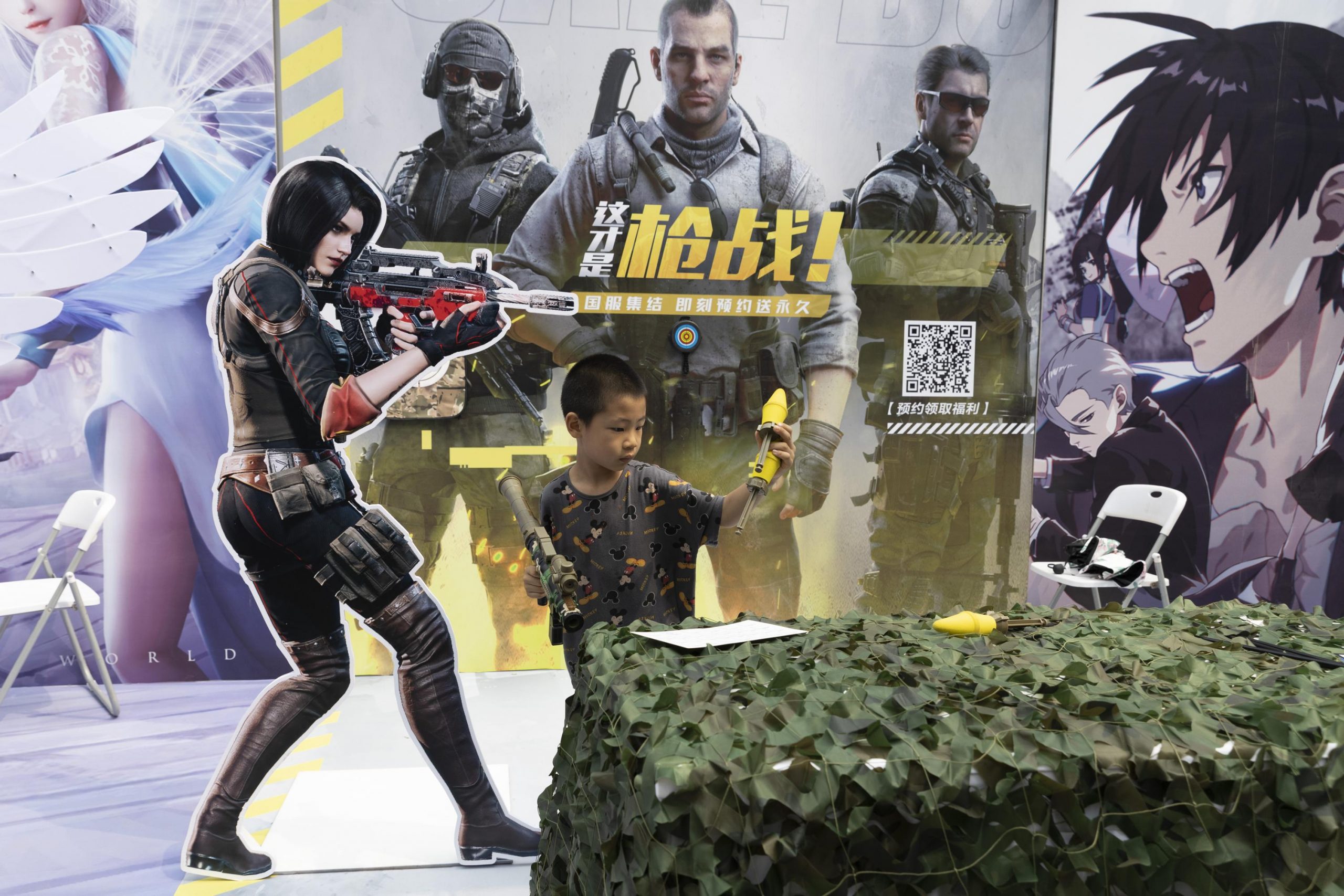China gaming stocks drop as Beijing curbs children’s online play
قيود صينية جديدة تضرب أسهم شركات الألعاب
Bloomberg
Chinese gaming stocks tumbled on Tuesday after regulators cut back the amount of time children can play online each week to just three hours.
The Hang Seng Tech Index slid 1.5%, led by shares of Bilibili Inc. and NetEase Inc., which fell by at least 4.6% in Hong Kong after declines in their American depositary receipts. Shares of Meituan dropped as much as 2.1% as concerns over renewed regulatory crackdowns outweighed the food delivery company’s strong second-quarter revenue beat.
“The regulatory environment is clearly continuing to pose a headwind for sentiment around China’s tech stocks and it’s tough to see a light at the end of the tunnel as that requires guessing the next move by the government,” said Bloomberg Intelligence analyst Matthew Kanterman. “Until the regulatory situation has clarity towards a final resolution, the headwind will likely remain in place.”
The escalation of restrictions on gaming adds to the pain for investors in Chinese technology companies, who’ve been hit by new rules on everything from ride-hailing platforms to online commerce to data security. The latest move has also brought a halt to a spurt of bargain hunting that had helped the sector claw back some of its losses over the past week.
China slashes kids’ gaming time to just three hours a week
The new rules will only allow gaming platforms to offer services to minors from 8 p.m. to 9 p.m. on Fridays, weekends and public holidays, according to state news agency Xinhua, which cited a release by the National Press and Publication Administration. China had previously restricted gaming hours for teens to 1.5 hours per day in 2019.
The curbs in China rippled through into the Tokyo market, with Nexon Co. and Koei Tecmo Holdings Co. leading declines in Japanese videogame makers. Nexon fell as much as 5% while Koei Tecmo dropped as much as 4.4%. Nexon received about of its 28% of its revenue from China in the last fiscal year.
Chinese gaming stocks listed in the U.S. came under pressure on the news on Monday, with the American depositary receipts of NetEase, Tencent Holdings Ltd., Bilibili and Huya Inc. all falling.
The Nasdaq Golden Dragon China Index — which tracks 98 firms listed in the U.S. that conduct a majority of their business in China — still managed to gained 0.7% after earlier falling as much as 2.5%. Yet the gauge has dropped 29% this year, including about 47% since its record high in February.
بلومبيرغ
تراجعت أسهم شركات الألعاب في الصينواليابان في ظلِّ تخفيض المنظِّمين في بكين مقدار الوقت المخصَّص للعب الأطفال على الإنترنت في أكبر سوق للألعاب بالعالم.
انخفض مؤشر “هانغ سينغ لأسهم التكنولوجيا” بنسبة 1.5%، بقيادة أسهم شركتي
“بيليبيلي” (Bilibili)، و” نت إيز إنك” (NetEase Inc)، اللتين تراجعتا في هونغ كونغ بعد هبوط شهادات الإيداع الأمريكية.
دفع تجدُّد البيع مؤشر هانغ سينغ القياسي للهبوط إلى أدنى مستوى له في أسبوع، في حين امتدت الخسائر إلى أسهم شركات الألعاب في طوكيو.
قال ماثيو كانترمان المحلل في “بلومبرغ إنتليجنس”: “من الواضح أنَّ البيئة التنظيمية تواصل وضع صعوبات على الثقة إزاء أسهم التكنولوجيا في الصين.. من الصعب رؤية ضوء في نهاية النفق، لأنَّ ذلك سيتطلَّب تخمين الخطوة التالية من جانب الحكومة”.
تزايد المعاناة
زاد تصعيد القيود على الألعاب من معاناة المستثمرين في أكبر شركات التكنولوجيا بالمنطقة، الذين تضرروا من القواعد الجديدة التي أقرَّتها بكين في كل القطاعات، بما في ذلك منصَّات النقل التشاركي، والتجارة الإلكترونية، وأمن البيانات. كما أوقفت الخطوة الأخيرة موجة اقتناص الصفقات التي ساعدت القطاع على تعويض بعض خسائره خلال الأسبوع الماضي.
انخفض سهم “بيليبيلي إنك” بنسبة 7.2%، في حين تراجع سهم “نت إيز” بـ 4.6%. وأشار كانترمان إلى أنَّ قاعدة عملاء “بيليبيلي” تميل قليلاً نحو الشباب أكثر من قاعدة عملاء “نت إيز”. في حين فقدت أسهم “تينسنت” 4% من قيمتها.
هبطت أسهم شركة توصيل الطعام العملاقة “ميتوان” خلال موجة التراجع اليوم الثلاثاء، بنسبة 2.1%، إذ فاقت المخاوف بشأن تجدُّد الإجراءات التنظيمية الصارمة أرباح الشركة القوية في الربع الثاني.
ستسمح القواعد الجديدة لمنصات الألعاب بتقديم خدمات للقصر من الساعة 8 مساء حتى 9 مساء في أيام الجمعة، وعطلات نهاية الأسبوع، والعطلات الرسمية فقط، وفقاً لوكالة أنباء الصين الجديدة ( شينخوا)، بحسب ما نقلت عن بيان صادر عن الإدارة الوطنية للصحافة والنشر. كانت الصين قد حدَّدت في السابق ساعات اللعب للمراهقين إلى 1.5 ساعة يومياً في عام 2019.
في طوكيو، قادت شركة ” نيكسون كو” (Nexon Co)، و” كوي تيكمو هولدينغز”
(Koei Tecmo Holdings) صناعة ألعاب الفيديو اليابانية إلى التراجع.
انخفض سهم “نيكسون” بنسبة 5%، في حين تراجع سهم “كوي تيكمو” بنسبة 4.4%. حقَّقت “نيكسون” حوالي 28% من إيراداتها من الصين في السنة المالية الماضية.
تعرَّضت أسهم الألعاب الصينية المدرَجة في الولايات المتحدة للضغط بسبب الأخبار أمس الإثنين، مع هبوط شهادات الإيداع الأمريكية لكلٍّ من “نت إيز”، و “تينسنت هولدينغز”، و”بيليبيلي”، و “هويا إنك” (Huya Inc ) بنسبة 1.1 % على الأقل.
ما يزال مؤشر “ناسداك غولدن دراغون تشاينا” الذي يتتبَّع أداء 98 شركة مدرَجة في الولايات المتحدة، وتدير غالبية أعمالها في الصين – قادراً على تحقيق مكاسب بنسبة 0.7% بعد أن انخفض في وقت سابق بنسبة 2.5%.
مع ذلك، انخفض المؤشر بنسبة 29% منذ بداية 2021، بما في ذلك حوالي 47% منذ ارتفاعه القياسي في فبراير.




